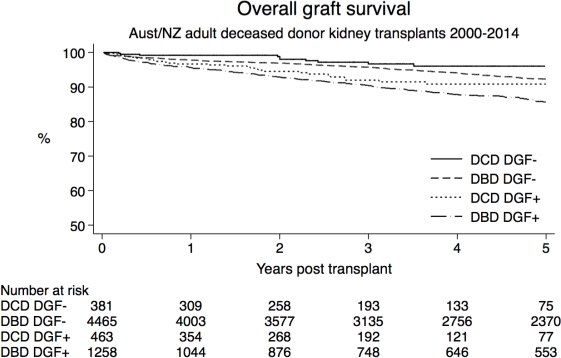Association Between Delayed Graft Function and Long-Term Outcomes After Kidney Transplantation from Donors After Circulatory Death.
1Australia and New Zealand Dialysis and Transplant (ANZDATA) Registry, Royal Adelaide Hospital, Adelaide, SA, Australia
2Central Northern Adelaide Renal and Transplantation Service, Royal Adelaide Hospital, Adelaide, SA, Australia
3School of Medicine, University of Adelaide, Adelaide, SA, Australia
4Renal Medicine, Royal Prince Alfred Hospital, Sydney, NSW, Australia
5Sydney Medical School, University of Sydney, Sydney, NSW, Australia.
Meeting: 2016 American Transplant Congress
Abstract number: C189
Keywords: Donors, Graft failure, Kidney transplantation, non-heart-beating
Session Information
Session Name: Poster Session C: Kidney Transplantation: AKI/Preservation/DCD
Session Type: Poster Session
Date: Monday, June 13, 2016
Session Time: 6:00pm-7:00pm
 Presentation Time: 6:00pm-7:00pm
Presentation Time: 6:00pm-7:00pm
Location: Halls C&D
Purpose: Delayed graft function (DGF) is associated with worse long-term outcomes after kidney transplantation from donation after brain death (DBD) donors. We aimed to determine whether this association held for transplantation from donation after circulatory death (DCD) donors.
Methods: Using data from the Australia and New Zealand Organ Donor (ANZOD) and Australia and New Zealand Dialysis and Transplant (ANZDATA) Registries, we included adult recipients of deceased donor kidney-only transplants in Australia and New Zealand over 2000-2014 (n=6748), excluding grafts with <7 days function (n=181). DGF was defined as the need for dialysis within 72h of transplantation. The relationship between DGF and death-censored graft survival was examined in a Cox model adjusted for donor, transplant and recipient factors.
Results: DGF occurred in 22% of DBD and 55% of DCD transplants (p<0.001). On unadjusted analysis DGF was associated with worse death-censored graft survival in both DBD and DCD donors. After adjusting for confounders, the hazard ratio (HR) (95% CI) for DGF was 1.32 (1.11, 1.58) in DBD transplants and 1.77 (0.87, 3.58) in DCD transplants (interaction HR 1.34 (0.65, 2.77), p=0.11).
After adjusting for confounders, the hazard ratio (HR) (95% CI) for DGF was 1.32 (1.11, 1.58) in DBD transplants and 1.77 (0.87, 3.58) in DCD transplants (interaction HR 1.34 (0.65, 2.77), p=0.11).
Conclusions: DGF was associated with worse death-censored graft survival in both DBD and DCD kidney transplants, with no statistically significant difference in the magnitude of this association between DBD and DCD transplants.
CITATION INFORMATION: Clayton P, Russ G, McDonald S, Chadban S. Association Between Delayed Graft Function and Long-Term Outcomes After Kidney Transplantation from Donors After Circulatory Death. Am J Transplant. 2016;16 (suppl 3).
To cite this abstract in AMA style:
Clayton P, Russ G, McDonald S, Chadban S. Association Between Delayed Graft Function and Long-Term Outcomes After Kidney Transplantation from Donors After Circulatory Death. [abstract]. Am J Transplant. 2016; 16 (suppl 3). https://atcmeetingabstracts.com/abstract/association-between-delayed-graft-function-and-long-term-outcomes-after-kidney-transplantation-from-donors-after-circulatory-death/. Accessed July 5, 2025.« Back to 2016 American Transplant Congress
